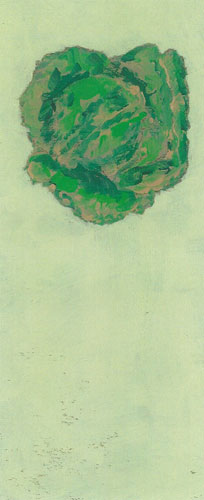Rich Ives
Garden Hose
It’s good for you, said the liquored up wild man watering his too well organized rows of cabbage as if several snaked foxes were gathered behind each watery eye.
The foxes were stealthily laying their eggs in the swamped cabbages, like moths. I couldn’t seem to avoid the impression that something biblical was happening. I believed I could breathe water. I believed transcendence led the way through the one green arm that I owned. It seemed to float as it danced to the constant green song.
If pebbles fall out of my head that seem to be paving a road, don’t assume I know where this is going. One night it came home with a chicken in its mouth and hissed at me. Another night exploded gently without offering a clue.
I attempted to impede the flow with placemats. The chef looked angry, his hoe raised in a threatening gesture of supplication, although he sounded just like Jesus. He didn’t seem to understand we weren’t reading an account of what had transpired.
So we corned the beef and boiled the cabbage and brought in some recitations and some cantors to season the broth. No mothers were allowed to fidget. No children were allowed to gather unto their own intentions in their holy innocence. This proved wise, and we enjoyed the odors in the hallway quite thoroughly until we realized the remaining rows of cabbage had become misaligned, a breach of gardening etiquette we could not continence.
The baby foxes were slithering cautiously between the skewed cabbages, and this gradually soaked in to our perceptions, emanating from the holiday-like festivities. Some of them were behaving lasciviously in the mud, and they were entirely too young for such beauty, so we tied them to stakes, hosed them down, and left them to dry in the sun. I hope we didn’t forget to release them.
Since that time I have realized that my watery words frequently fail to dissuade me from more watery words. I compare this to my brain’s invitations and my thoughts drool a bit more. The overflow seems wealthy. Nobody knows when the invitations will end.
Gouge
Some of the old wounds haven’t been properly introduced. They’re illiterate until the right mistake is made. Like putting a sack over one’s head to keep from staring at the sun. Like learning to hum back the song of a leaf impaling itself on a broken twig. You could do these things all day. You could put your eyes on a plate and look at them.
You could be a child and poke at it. You could win. You could lose your sense of yourself. You could lose yourself. You could be a mass of careful wounds. You could still win.
You could introduce the scars to their reasons, the accidents to the mistakes you would like to blame them on, the places untouched to the places touched lovingly. You could introduce a whole lot more than pain to a whole lot more than merely success. You could develop a need to cut your own path, to display what you’ve made of yourself, the cuts as honors. You could name the ways you have done this as if the cuts were children who were only briefly yours. You could praise their past. You could lose your own in it. You could still win, couldn’t you?
You could be my twin and not be there. You could be two twins and not be there twice. You could be me and not be there. You could still win.
You could put hair around the wounds. Ethnic hair. Give the wounds character. You could carve some distractions. More character. You could study how to make inanimate objects animate. You could apply yourself.
Take along with you the part that is your tense presence. Take with you the refusal to sign. Take the signing. You could be there beneath the surface. You could discover where you live. Why you live there takes a lot longer. You might have to live there a lot longer to know that. By that time the wounds won’t be so careful. You’ll know what they mean. Then you can apply the right pressure, which is not the same as winning.
Rich Ives has received grants and awards from the National Endowment for the Arts, Artist Trust, Seattle Arts Commission and the Coordinating Council of Literary Magazines for his work in poetry, fiction, editing, publishing, translation and photography. His writing has appeared in Verse, North American Review, Dublin Quarterly, Massachusetts Review, Northwest Review, Quarterly West, Iowa Review, Poetry Northwest, Virginia Quarterly Review, Fiction Daily and many more. He is the 2009 winner of the Francis Locke Memorial Poetry Award from Bitter Oleander. In 2011 he received a nomination for The Best of the Web and two nominations for both the Pushcart Prize and The Best of the Net. He is the 2012 winner of the Creative Nonfiction Prize from Thin Air magazine. His book of days, Tunneling to the Moon, is currently being serialized with a work per day appearing for all of 2013 at http://silencedpress.com
